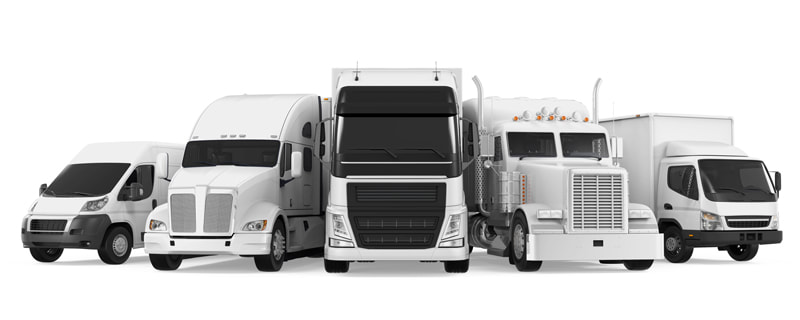PECO Insurance Blog |
Peco Insurance Agency enhances customer experience by partnering with top carriers in the industry7/17/2023 Peco Insurance Agency, a leading provider of commercial trucking insurance, announces its new and improved insurance services thanks to its partnership with top carriers like Progressive, Berkshire Hathaway, Cover Whale, and Canal. As part of the company’s commitment to enhance customer experience, Peco Insurance Agency is now offering faster quotes, better prices, and better service.
The company understands that in order to meet the demands of its growing clientele, it is paramount to offer customized and cost-effective solutions that cater to their unique needs. Here are some of the benefits that customers will enjoy as a result of this partnership. Faster Quotes The complexities of the commercial trucking industry make it challenging to navigate the insurance landscape. With Peco Insurance Agency’s partnership with top carriers, customers can expect faster quote processing time which will reduce the wait time for coverage. The company will have access to a wider range of insurance companies to offer fast and efficient quotes for customers. These carriers include fleet insurance solutions for trucking companies. Better Prices Cost is a significant consideration in the trucking industry since it significantly impacts profit margins. Partnering with top carriers gives Peco Insurance Agency the ability to offer better pricing to customers. Top carriers can provide competitive pricing to customers, which translates to significant cost savings for businesses. Peco Insurance Agency's partnerships give them the edge to offer its customers the best pricing options in the industry. Better Service With a partnership mindset in mind, Peco Insurance Agency’s partnership with top carriers will not hinder the company's service quality. The streamlined communication paths within the companies will ensure customer satisfaction remains high, and tools from each insurance company will help streamline the processes and provide faster claim resolution. The customers will still be able to access Peco’s exceptional customer service, but will have the added benefits of the partner carriers. Wide range of Coverage Options The partnership between Peco Insurance Agency and top carriers means that customers will have access to a wide range of coverage options. This includes solutions for all types of trucks, including cargo, dump trucks, and passenger vans, as well as general liability protection, Hired & Non-Owned Auto Insurance, Workers Compensation coverage and much more. The company will also provide more comprehensive coverage for customer's specific needs. As a provider of commercial trucking insurance, Peco Insurance Agency's partnership with top carriers like Progressive, Berkshire Hathaway, Cover Whale, and Canal is a bold move that will propel the company in their industry. Through faster quotes, better pricing, better service, and a wider range of coverage options, customers will enjoy the best of the industry's offerings. The company's increased offerings and range of insurance solutions will allow them to strengthen its services' quality and customer satisfaction levels. With Peco Insurance Agency’s commitment to delivering excellent customer service, combined with their partnership carriers’ expertise and coverage options, customers remain in good hands. ATA’s Law Enforcement Advisory Board supports Operation Safe Driver Week/By The Trucker News Staff -7/11/2023 WASHINGTON — In support of Operation Safe Driver Week, which runs through July 15, the American Trucking Associations’ Law Enforcement Advisory Board (LEAB) is encouraging all drivers to engage in safe practices and share the road.
ATA established the LEAB in 2021 “to help strengthen the ties between the trucking industry and law enforcement community and better align our resources toward the common goal of promoting safety on the nation’s roadways,” an ATA news release stated. The LEAB is comprised of ATA members with experience in federal, state and local law enforcement, as well as current and retired law enforcement officials who serve or served in the CMV domain. “Unsafe drivers endanger their own lives as well as the lives of others,” said Fred Fakkema, chairman of the LEAB and vice president of safety and compliance for Zonar Systems. “Law enforcement professionals are on alert every minute of every day to help prevent collisions by pulling over distracted or aggressive drivers. Operation Safe Driver Week helps to elevate the issue of safety and gives all drivers an opportunity to reflect on how they can be a part of the solution to safer roads.” Mark Savage, first vice chair of the LEAB and director of connected truck solutions at Drivewyze, said that as a former CVSA president, “I know what an important role Operation Safe Driver Week plays in ensuring the safety of everyone on the road. The vast majority of fleets already take safety very seriously, and for most, this will just be business as usual. The larger patrol presence drivers will see next week will help reinforce safe driving practices and target those who fail to obey the rules of the road.” Steve Dowling, second vice chair of the LEAB and director of enterprise safety training at Covenant Logistics, said that safety on America’s roadways depends on everyone working together. “Operation Safe Driver Week shines a spotlight on safety through education and enforcement actions and gives greater visibility to the brave police officers and state troopers who put their lives on the lines to protect our communities every day,” Dowling added. Examples of unsafe driving behaviors include improper lane changes, passing or turns; driving while under the influence of drugs or alcohol; using a handheld device; and failure to wear a seat belt. This year, a particular emphasis will be placed on deterring speeding. According to NHTSA, an estimated 42,795 people died in motor vehicle traffic crashes last year. FAST FACTS
Trucking companies are required by law to purchase Auto Liability or Truck Liability Insurance. This insurance provides protection for the motor carrier for legal liability arising out of the ownership, maintenance, and use of any insured automobile. The minimum limit that can be purchased is $750,000 combined single limit per state and federal regulations (BMC-91 or BMC-91X). We encourage all clients to strongly consider purchasing $1 million in coverage as it is a common requirement from freight brokerages and shippers. It also affords better protection to the motor carrier as a single accident can produce claims well exceeding either of these totals.
The FMCSA BMC-91/91X requires that motors carriers who transport certain hazardous cargo maintain a total of $5 million in auto liability coverages in those instances. It is also common and good practice for all motor carriers to consider purchasing excess or umbrella policies to properly address their risk. -Physical damage insurance is a type of insurance that covers physical damage to your property. This type of coverage is typically offered as part of an auto insurance policy, although it may need to be added on to a standard auto policy.
Physical damage can include collisions, fire damage, water damage, damage from falling objects, lightning, and wind. Most like price is base on the value of the vehicle, they can calculate at %, from 5% to 9%, depend on driving history. It is not a mandatory type o coverage, if you own the vehicle. But if you are financing, will be requested by the finance institution. Physical damage can include collisions, fire damage, water damage, damage from falling objects, lightning ... The Federal Motor Carrier Safety Administration is starting the process to launch a driver simulator study to evaluate how truck drivers engage with rigs equipped with different levels of autonomous technology.
The agency plans to submit a request to the White House’s Office of Management and Budget for the study titled “Human Factors Considerations in Commercial Motor Vehicle Automated Driving Systems [ADS] and Advanced Driver Assistance Systems [ADAS].” The driving simulator would include a series of questionnaires to evaluate approximately 100 drivers and how they interact with trucks equipped with SAE International Level 2 ADAS and Level 3 ADS. The study would examine the effect of non-driving secondary task engagement, transfer of control, and training on driver behavior in trucks equipped with the systems, FMCSA said. The agency noted that “higher levels of ADAS and lower levels of ADS present an environment that is ripe for overreliance.” Level 2 vehicle “offers longitudinal and lateral support to the driver; however, the driver is still responsible for driving at all times,” FMCSA said, adding that “at this level, engaging in non-driving secondary tasks can be highly detrimental to driving performance as the driver may not recognize and respond to hazards timely or appropriately.” In a truck equipped with Level 3 ADS, “the role of distraction is blurred. L3 is the lowest level considered to be ADS,” the agency said. “The driver takes on a more supervisory role and is in full control of the vehicle in a limited number of situations. When an L3 vehicle alerts the driver that a takeover is required, the driver needs to have situational awareness to resume full control of the vehicle. Engagement in non-driving secondary tasks may prevent the driver from maintaining situational awareness of the driving environment.” FMCSA said the three primary goals for the data collection are: Determine the effect of distraction on CMV drivers of Level 2 vehicles Determine the effect of transfer of control on CMV drivers in Level 3 vehicles Develop and evaluate a training program that is designed to decrease the levels of distraction that were identified in CMV drivers in Level 2 vehicles and designed to improve the problems with the transfer of control that were identified in Level 3 vehicles Trucking News JUNE 27, 2023 FMCSA Removes All Ways Track LLCs and All Ways Track ELD from Registered ELD List
Monday, March 27, 2023WASHINGTON – The U.S. Department of Transportation Federal Motor Carrier Safety Administration (FMCSA) has removed All-Ways Track ELD from the list of registered Electronic Logging Devices (ELD). FMCSA has placed All-Ways Track ELD on the Revoked Devices list due to the company’s failure to meet the minimum requirements established in 49 CFR part 395, subpart B, appendix A, effective March 27, 2023.
FMCSA will be sending an industry email to let motor carriers know that all who use All-Ways Track ELD must take the following steps:
During this period, safety officials are encouraged not to cite drivers using All-Ways Track ELDs for 395.8(a)(1) – “No record of duty status” or 395.22(a) – “Failed to use a registered ELD.” During this time, safety officials should request the driver’s paper logs, logging software, or use the All-Ways Track ELD display as a back-up method to review the hours of service data. Beginning May 26, 2023, motor carriers who continue to use the revoked ELD listed above would be considered to be operating without an ELD. Safety officials who encounter a driver using a revoked ELD on or after May 26, 2023 should cite 395.8(a)(1), and place the driver out-of-service (OOS) in accordance with the Commercial Vehicle Safety Alliance OOS Criteria. FMCSA strongly encourages motor carriers to take the actions listed above now to avoid compliance issues in the event that the deficiencies are not addressed in time. For more information on ELDs, visit FMCSA’s ELD implementation website. # # # Are you wondering if you need a Commercial Driver License (CDL)? If so, you're in the right place! Keep reading to find out what you need to know about obtaining a CDL and the requirements involved. First off, it's important to note that all CDL applicants must have an Operator's License, pass vision requirements, and pass knowledge and skills tests. Applicants must also be at least 18 years old, and if they are under 21, they will be restricted to intrastate operation only. Knowledge tests are available in multiple languages and may be taken orally in English or Spanish, with the exception of the hazardous materials test. Skills tests must be conducted in English, and interpreters are not allowed during any tests. Be sure to review the CDL Handbook to prepare for your tests. There are different requirements depending on the type of vehicle you plan to operate. For trucks or truck combinations weighing 26,001 lbs or more, and towing a vehicle/unit over 10,000 lbs, a Class A license is required. This license requires passing the General Knowledge Test, Combination Vehicles Test, Air Brakes Test (if applicable), and applicable exams for desired endorsements, as well as the Pre-trip Vehicle Inspection, Basic Vehicle Control, and On-road Test skills tests. For straight trucks and buses weighing 26,001 lbs or more, a Class B license is required. This license requires passing the General Knowledge Test, Air Brakes Test (if applicable), and applicable exams for desired endorsements, as well as the Pre-trip Vehicle Inspection, Basic Vehicle Control, and On-road Test skills tests. If you plan to operate vehicles transporting placarded amounts of hazardous materials or vehicles designed to transport 16 or more people, including the driver, with a Gross Vehicle Weight Rating of less than 26,001 lbs, you will need a Class C license. This license requires passing the General Knowledge Test, Air Brakes Test (if applicable), and applicable exams for desired endorsements, as well as the Pre-trip Vehicle Inspection, Basic Vehicle Control, and On-road Test skills tests. If you already have an out of state or Canadian CDL, we will reciprocate it. However, if you have a hazmat endorsement, you will need to reapply for it, which will include a background check, appropriate tests, and fees. If you have a military CDL, you may be exempt from taking the skills tests if you present the Certification for Waiver of Skill Test for Military Personnel form completed by your commanding officer or designee. Endorsements are special authorizations that permit you to drive certain types of vehicles, transport certain types of property, or a certain number of passengers. The following endorsements can be placed on Class A, B, or C commercial driver licenses: Placarded Hazmat (H), Tank Vehicles (N), Passengers (P), School Bus (S), Double/Triple Trailers (T), and Placarded Hazmat & Tank Vehicles (X). In summary, obtaining a CDL requires passing knowledge and skills tests, being at least 18 years old, and meeting different requirements depending on the type of vehicle you plan to operate. Don't forget to review the CDL Handbook and consider obtaining endorsements to expand your opportunities as a commercial driver. Monday, March 27, 2023. News from FMCSA website
WASHINGTON – The U.S. Department of Transportation Federal Motor Carrier Safety Administration (FMCSA) has removed All-Ways Track ELD from the list of registered Electronic Logging Devices (ELD). FMCSA has placed All-Ways Track ELD on the Revoked Devices list due to the company’s failure to meet the minimum requirements established in 49 CFR part 395, subpart B, appendix A, effective March 27, 2023. FMCSA will be sending an industry email to let motor carriers know that all who use All-Ways Track ELD must take the following steps:
During this period, safety officials are encouraged not to cite drivers using All-Ways Track ELDs for 395.8(a)(1) – “No record of duty status” or 395.22(a) – “Failed to use a registered ELD.” During this time, safety officials should request the driver’s paper logs, logging software, or use the All-Ways Track ELD display as a back-up method to review the hours of service data. Beginning May 26, 2023, motor carriers who continue to use the revoked ELD listed above would be considered to be operating without an ELD. Safety officials who encounter a driver using a revoked ELD on or after May 26, 2023 should cite 395.8(a)(1), and place the driver out-of-service (OOS) in accordance with the Commercial Vehicle Safety Alliance OOS Criteria. FMCSA strongly encourages motor carriers to take the actions listed above now to avoid compliance issues in the event that the deficiencies are not addressed in time. For more information on ELDs, visit FMCSA’s ELD implementation website. |
Contact Us(704) 837-2942 Archives
December 2023
Categories |








 RSS Feed
RSS Feed